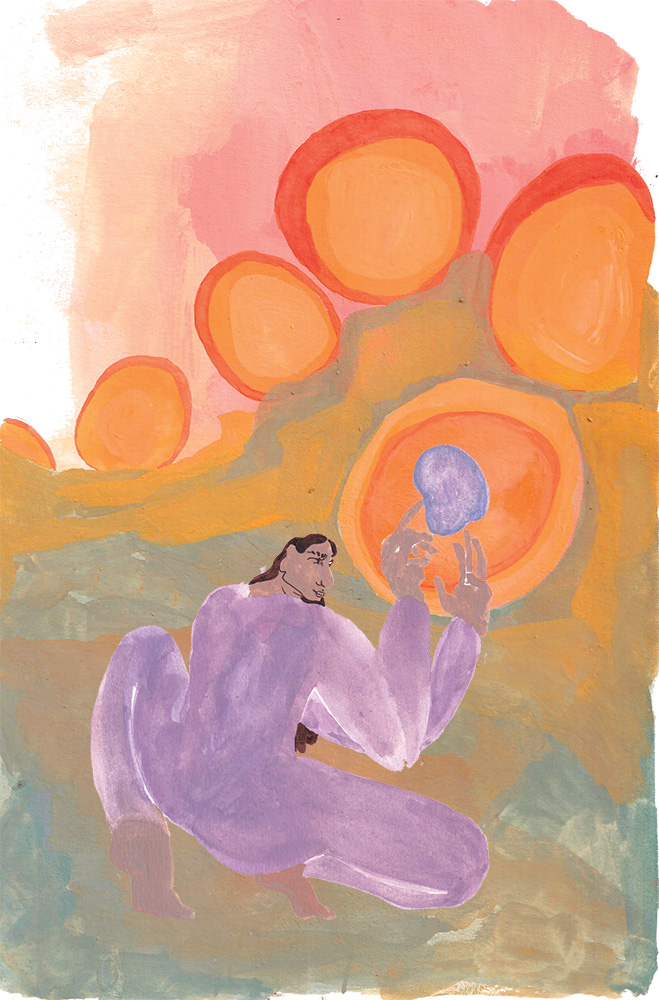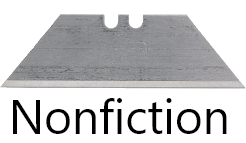And Her Feet Were Cold

art by Ellen Abrams King
The grass sticking to my feet stayed with me most. Maybe it was something in the summers of the 2000s, third, fourth, fifth grade. Finding out who I was going to be and how fast I could run through the dark.
We had an acre of land around our house—the last house on the road. Behind me trees cradled the sky in their branches; in front of me stretched fields of cattails and mint, Indian paintbrushes and my sister’s willow tree. Western Massachusetts was huge to me then, and I didn’t yet know that I lived far from things.
I collected bugs and thought I would be an entomologist. In the summers I read Calvin and Hobbes under two ageless maples. When the Clarks came to hay the upper fields as they always did, the tractor pulling autumn behind it and smelling of apples and leaves, what I remember most were those lost nights in the dewy grass.
Sometimes the cold does more than nip our toes; sometimes it moves inside and all I know is that wavering image in my head has no future and no surprises. It’s been living there for years but it came too late in a way and in a way it’s too young. I don’t know how to run in the dark, but I do know how to stand still and listen. The fireflies wink out one by one, and all that’s left is how I came to be here.
And grass leaves were sticking to her feet.
They’d dried long ago—some say minutes, or hours, but she said years. She swore it had been years (too many and too few). Years since she temporarily lost everything to silence. She was—is—me. She is who I was.
When the grass was wet and cold, the air closed in with lightning bugs and hay dust. It was fifth grade, or fourth, or third, and my sister and I stepped into the night. Time seemed endless in those summers, and Massachusetts was the center of it all. I inhaled darkness and it moved into my lungs, inhabited my blood. I inhaled it all, and my eyes opened wide on the sky consumed everything they could.
Those were the months I saw nothing of my future. I could be in the stars, or on the driveway. I thought I wanted to study paleontology or genetics, mapping patterns and eons on the earth. When the summer ended, I went back to school and scribbled in the margins of the present. Entomology, astronomy, biology. I only drew, then. I hadn’t yet thought to put the summer night into words.
I came inside and peeled the leaves from my heels, layer upon layer of footsteps. They were cold and wet and wonderful.
Does grass have leaves?
All I know is that’s what it used to be—grass and leaves and one thing, slick with summer dew—colder than it should have been. Maybe a slug or maybe tomorrow, waiting for the moment I stopped running.
And that’s how things were, back when fireflies were lightning bugs and jam jars had holes punched in their lids. Back when dreams were indistinguishable from reality, and I remembered more than I’d ever lived.
Can you remember how you died before you were born?
I knew I’d drowned. I told my mother that’s why I didn’t want to learn how to swim. I’m still scared of water, of what waits underneath. I never did learn how to swim away. So much for that one dream, one possibility jotted in the margin—marine biology.
I am settled now and standing under the stars, looking—but there’s no time for learning the patterns. Ten years and I’m trapped in the future, my mind filled with images of winter and paper and tarmac. It could have never happened, but she was me once and I think she’s in there still, running through the dark in bare feet.
The ground is steady under me, and I know which chance I took. My feet are warm now, but the memory still eddies, pulling my words away. Why did I stop running? Was it because I got too heavy, too tired? There aren’t as many crickets as there used to be, and when the Clarks come to hay, the fireflies dwindle.
And grass doesn’t have leaves. Grass is just grass.


